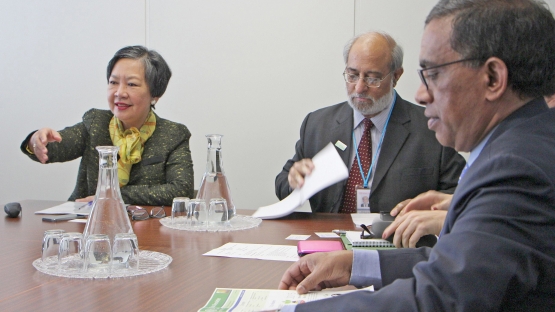The IAEA seeks to expand the contribution of nuclear technologies to global peace and prosperity. As nuclear science and technology can make important contributions in many different areas, the Agency seeks to build constructive partnerships with fellow UN organizations, research institutes and non-governmental organizations (NGOs).
In March 2015, IAEA Deputy Director General Dazhu Yang and Dr Ismahane Elouafi, Director General of the International Centre for Biosaline Agriculture (ICBA), signed a Practical Arrangement which laid the foundation for cooperation and mutual support in the areas of desertification and land degradation, soil and water management, water-use efficiency, and agricultural research. The PA calls for an "exchange of data of mutual interest and relevance," thereby facilitating the work conducted by the respective institutions.
In follow up to the signing of the Agreement, a meeting was held on 4-5 November at the Agency's Vienna headquarters to prepare a mutually-agreeable action plan in order to operationalize the budding collaboration. Najat Mokhtar, Director of the Division for Asia & the Pacific, welcomed Dr Shoaib Ismail, Director of Research and Innovation, and other ICBA representatives to the IAEA's headquarters.
IAEA experts delivered a series of presentations which demonstrated the extensive work conducted under the IAEA's technical cooperation programme in the areas of isotope hydrology and mutation-induced plant breeding, as well as in soil and water management.
Underscoring the ultimate objective of the Practical Arrangement-which is to strengthen capacities for the management of soils, water, crops and nutrients-Director Mokhtar outlined the process through which the IAEA reviews skill gaps, identifies regional needs, and develops the appropriate training modules to build the required human resources.
In the concluding session of the bilateral meeting, the IAEA and ICBA agreed that the two institutions would agree on the TC projects that should receive ICBA support by the end of December 2015. In addition, five thematic areas for future projects were defined. It was also agreed that joint brochures and success stories would be prepared and published for communications purposes.
Background
Based in Academic City, Dubai, the ICBA is a not-for-profit organization devoted to research and development in marginal, often arid and semi-arid, environments. These environments have sources of water, such as underground aquifers, but the water is frequently brackish or saline. Traditionally, irrigation with salt water would lead to soil salinization, rendering the topsoil unfit for most kinds of crop cultivation. In studying the biochemical and physiological mechanisms of salt tolerance in plants, however, the ICBA is developing methods to selectively breed plants for halotolerance, control the ripening process, and increase desirable traits (such as sugar concentration in fruit).




